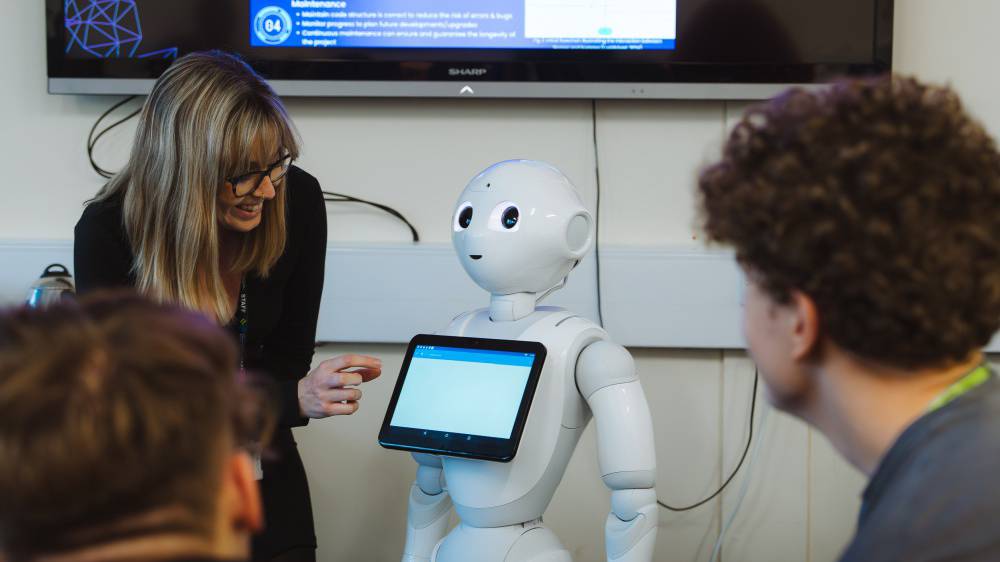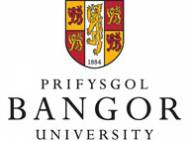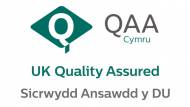BSc (Hons) Computing (Software Development) (Top-up)
Key Details
- Available at:Rhos-on-Sea
- Study Mode:Part-time, Full-time
- Course Length:
Full-time: 1 year
Tuesday & Friday, 9am-5pm
- UCAS Codes:G402
BSc (Hons) Computing (Software Development) (Top-up)University-level Courses
Part Time
If you are applying to study part-time you can apply directly to the campus of your choice.
Full Time
If you are applying to study full-time you can apply directly to the campus of your choice.
Course Description
This programme is undergoing re-validation.
The BSc (Hons) Computing – Software Development course allows you to build on your existing Level 5 qualification, deepening your expertise and preparing you for higher-level professional roles or postgraduate study.
You’ll refine your technical and analytical skills by undertaking advanced modules and real-world projects, applying the methods and techniques you’ve previously learned to develop innovative computing solutions. The course focuses on critical thinking, independent learning, and decision-making, helping you confidently manage complex tasks and professional challenges.
Distinctive features of the top-up degree include opportunities for cross-disciplinary study, a strong emphasis on practical application, and a focus on career-ready development. Graduates leave with the knowledge, creativity, and adaptability needed to thrive in the fast-paced computing industry.
Modules include:
- Advanced Programming
- BSc Dissertation
- Group Project
- Physical Computing
- Software Engineering
Additional information
More detailed information on Modules is to be found in the ‘Additional Campus/Course Information’ section.
Entry Criteria
Academic Requirements
Entry onto level 6 will be direct for those progressing students from the GLLM Foundation Degree Computing to the respective GLLM Bachelor Degree (Hons), Computing, after successful completion of the foundation degree. Progressing students must remain on their chosen pathway (Software Development or Networking).
Where students take a break from their studies following completion of their Foundation Degree, applications for direct entry should be made via the Credit Transfer process.
Entry onto level 6, for external applicants, will be considered on an individual basis in line with GLLM credit transfer policy, based on previous successful study of 120 credits per level in a compatible qualification (within the time frame outlined in the policy).
Language Requirements
- GCSE in Welsh or English as first language, grade C/4 or above
- Any degrees, diplomas or certificates eligible should have been taught and assessed in Welsh or English, or
- For overseas applicants, for entry onto Levels 5 or above, English fluency to IELTS 6.0 or higher (with no element less than 5.5)
If your qualifications do not meet the entry requirements listed above, we would still encourage you to apply for the course you're interested in, as many of our courses will consider learners based on their previous work and skills experience rather than their qualifications.
Delivery
The course is delivered through a blend of the following:
- Lectures
- Presentations
- Interactive tasks
- Group Work
- Guest speakers
Most of the delivery is in-person; however, some modules can be delivered online too.
Timetable
- Full-time: 1 year, 2 days per week (typically 9.00 am – 5.00 pm)
Fees
Visit our course fees page for information on full and part-time degree course fees.
Financial Support
Visit our financial support page for information on the range of support available.
More detailed information on other costs associated with your course and work placements/work experience (if applicable) will be outlined in the programme validation document and explained to you at your interview.
You will need a home computer or laptop and a reliable internet service.
Start date
September
Contact:
For specific course enquiries, please contact:
Mark Roberts (Programme Leader): robert19m@gllm.ac.uk
David Clarke (Administration): clarke1d@gllm.ac.uk
For general enquiries about our degrees, please contact: degrees@gllm.ac.uk
Assessment
The course is assessed through a blend of the following:
- Software programmes
- Reports
- Portfolios
- Case Studies
- Presentations
- Lab Work
- Reflection
- Time constrained assessment
Feedback
Where relevant, assessments will be marked and returned to students with constructive and developmental feedback. Effective feedback combines information which enables students to understand the strengths and limitations of their past performance, and information which enables them to recognise how future performance can be improved. Students will be provided with feedback in a timely manner and this feedback will justify how the grade has been awarded. Students will have the opportunity to reflect on the feedback given and identify their strengths, things they found challenging and areas for development that they will feed forward to their next assessment. Feedback will include linking evidence to assessment criteria to demonstrate how the student will have met the learning outcomes.
Progression
This BSc Computing (Software Development) degree will prepare you for a variety of careers in web application development, software engineering, programming, communications and networking, computer applications, IT management, computer sales and marketing.
Campus Information Rhos-on-Sea
This course builds on skills gained during a previous Level 5 Software Development qualification.
For every 10 credits, students should engage with around 100 notional hours of learning. This will be approximately 30% direct learning contact 70% independent student learning.
Advanced Programming (20 credits, core)
This module advances your programming skills by focusing on the use of complex techniques to create integrated, data-driven applications. You’ll learn how to design and develop solutions that connect services and share data across platforms, building both client and host applications to demonstrate real-world distributed programming. (40% Prototype, create and test a selection of small applications, 60% Prototype, create and test a complex data driven set of applications)
BSc Dissertation (40 credits, compulsory)
This module gives you the opportunity to explore a specialist area of computing through an independent research or project-based dissertation. You’ll apply and expand your knowledge and skills while developing independence, critical thinking, and problem-solving abilities. Working within Grŵp Llandrillo Menai’s Research and Ethics framework, you’ll produce a professional dissertation that includes a proposal, literature review, and clear methodology, either through original research or by applying computing theories and techniques to a practical project. (80% Dissertation, 20% Viva)
Group Project (20 credits, compulsory)
This module gives you the opportunity to work collaboratively in small groups to plan and deliver a project within a chosen area of computing. You’ll apply and extend your technical knowledge while developing key teamwork, communication, and leadership skills. Working with guidance from a tutor, you’ll take responsibility for every stage of the project, from proposal and planning to delivery and evaluation, using a professional, problem-solving approach to achieve a successful outcome. (10% Group proposal, 20% Group project folder containing documentation appropriate to the project scope, 40% Completed project, 30% Reflection)
Group Project (20 credits, compulsory)
This module gives you the opportunity to work collaboratively in small groups to plan and deliver a project within a chosen area of computing. You’ll apply and extend your technical knowledge while developing key teamwork, communication, and leadership skills. Working with guidance from a tutor, you’ll take responsibility for every stage of the project, from proposal and planning to delivery and evaluation, using a professional, problem-solving approach to achieve a successful outcome. (10% Group proposal, 20% Group project folder containing documentation appropriate to the project scope, 40% Completed project, 30% Reflection
Physical Computing (20 credits, compulsory)
This module introduces the principles of hardware and software interaction through hands-on exploration and experimentation. You’ll begin by developing a solid understanding of basic electricity and electronics before applying this knowledge to a practical physical computing project.
Working on a project of your choice, you’ll design, build, and test a system that combines hardware inputs and outputs with software control, gaining valuable experience in creating and documenting an integrated computing solution. 10% Time-constrained (1 hour) closed book class test. 80% Design, create, test and document a physical computing project, 10% Presentation
Software Engineering (20 credits, core)
This module builds on your knowledge of software development and project management, focusing on the skills needed to design, develop, and maintain a range of computer systems. You’ll explore software engineering concepts and methodologies, from traditional approaches to Agile, and learn how to apply them effectively in real-world projects.
Through practical application, you’ll gain experience in all stages of the software lifecycle, including design, implementation, maintenance, and version control, preparing you for professional practice in the computing industry. 20% Report, 70% Design and prototype, create and test a complex data driven set of applications, 10% Reflection
Other details
Course type: University-level Courses
Level:
6
Programme Area:
- Computing, Digital Technologies and Games Development
- International
Awarding Body: Bangor University
Computing, Digital Technologies and Games Development
Learn more about this area and see our course level guide:
Computing, Digital Technologies and Games Development

Awarding Body

